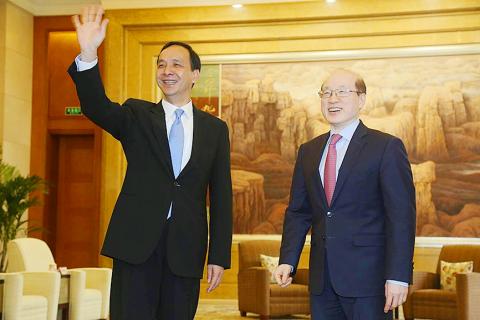New Taipei City Mayor Eric Chu (朱立倫) and China’s Taiwan Affairs Office Minister Liu Jieyi (劉結一) yesterday reiterated the so-called “1992 consensus” as a basis for cross-strait relations as they met in Shanghai.
Chu is the first Taiwanese politician to meet Liu since the Chinese Communist Party’s (CCP) Central Committee announced the former UN ambassador’s appointment earlier this month.
Insistence on the “1992 consensus” has been the consistent position of the Chinese Nationalist Party (KMT), Chu said.

Photo courtesy of New Taipei City Government
Even though the KMT is now the opposition party, this stance would not change, and it hopes that the two sides of the Taiwan Strait can engage in peaceful exchanges and achieve win-win cooperation, Chu said.
Although the political circumstances have changed, what people hope for most is peace, he said.
Local-level exchanges must also continue, as the two sides could learn about city governance from each other, he said.
Beijing insists on the “1992 consensus,” which reflects the “one China” principle and opposes Taiwanese independence schemes in any form, Liu said.
“The mainland’s policies toward Taiwan are to continue to uphold the ‘two sides of the Strait, one family’ ideology,” he said.
China hopes the two sides can work together for the peaceful development of relations and “jointly promote the process of the peaceful reunification of the motherland,” Chinese state media quoted Liu telling Chu.
The “1992 consensus” — a term former Mainland Affairs Council chairman Su Chi (蘇起) said in 2006 that he had made up in 2000 — refers to a tacit understanding between the KMT and the CCP that the two sides acknowledge there is “one China,” with each side having its own interpretation of what “China” means.
In Taipei, the Mainland Affairs Council said the government holds a positive attitude toward city-level cross-strait exchanges, but they must be handled according to relevant guidelines.
Attention must be paid to reciprocal respect, while issues pertaining to public power fall within the authority of the central government and no agreements are to be signed, it added.
The New Taipei City Government should remember to follow the relevant guidelines when it engages in cross-strait exchanges with other cities, the council said.
China should not set a one-sided political framework to limit cross-strait exchanges, it added.
In related developments, the Ministry of National Defense (MND) said several Chinese military aircraft were spotted flying over the Bashi Channel yesterday as part of a long-range flight training mission in the western Pacific.
The aircraft included Su-30s, Shaanxi Y-8 transport planes and Xian H-6 bombers, which all returned to their bases in China on the same route, the ministry said.
It said it had scrambled aircraft to shadow the Chinese planes until they returned to their bases.
The military is maintaining a close watch on Chinese military movements and the necessary measures to ensure national security, the ministry added.
Additional reporting by CNA and Reuters

CHAOS: Iranians took to the streets playing celebratory music after reports of Khamenei’s death on Saturday, while mourners also gathered in Tehran yesterday Iranian Supreme Leader Ayatollah Ali Khamenei was killed in a major attack on Iran launched by Israel and the US, throwing the future of the Islamic republic into doubt and raising the risk of regional instability. Iranian state television and the state-run IRNA news agency announced the 86-year-old’s death early yesterday. US President Donald Trump said it gave Iranians their “greatest chance” to “take back” their country. The announcements came after a joint US and Israeli aerial bombardment that targeted Iranian military and governmental sites. Trump said the “heavy and pinpoint bombing” would continue through the week or as long

TRUST: The KMT said it respected the US’ timing and considerations, and hoped it would continue to honor its commitments to helping Taiwan bolster its defenses and deterrence US President Donald Trump is delaying a multibillion-dollar arms sale to Taiwan to ensure his visit to Beijing is successful, a New York Times report said. The weapons sales package has stalled in the US Department of State, the report said, citing US officials it did not identify. The White House has told agencies not to push forward ahead of Trump’s meeting with Chinese President Xi Jinping (習近平), it said. The two last month held a phone call to discuss trade and geopolitical flashpoints ahead of the summit. Xi raised the Taiwan issue and urged the US to handle arms sales to

State-run CPC Corp, Taiwan (CPC, 台灣中油) yesterday said that it had confirmed on Saturday night with its liquefied natural gas (LNG) and crude oil suppliers that shipments are proceeding as scheduled and that domestic supplies remain unaffected. The CPC yesterday announced the gasoline and diesel prices will rise by NT$0.2 and NT$0.4 per liter, respectively, starting Monday, citing Middle East tensions and blizzards in the eastern United States. CPC also iterated it has been reducing the proportion of crude oil imports from the Middle East and diversifying its supply sources in the past few years in response to geopolitical risks, expanding

Pro-democracy media tycoon Jimmy Lai’s (黎智英) fraud conviction and prison sentence were yesterday overturned by a Hong Kong court, in a surprise legal decision that comes soon after Lai was jailed for 20 years on a separate national security charge. Judges Jeremy Poon (潘兆初), Anthea Pang (彭寶琴) and Derek Pang (彭偉昌) said in the judgement that they allowed the appeal from Lai, and another defendant in the case, to proceed, as a lower court judge had “erred.” “The Court of Appeal gave them leave to appeal against their conviction, allowed their appeals, quashed the convictions and set aside the sentences,” the judges